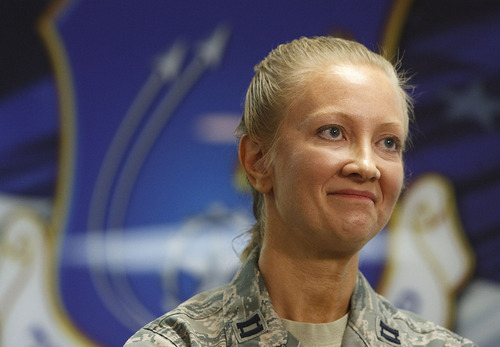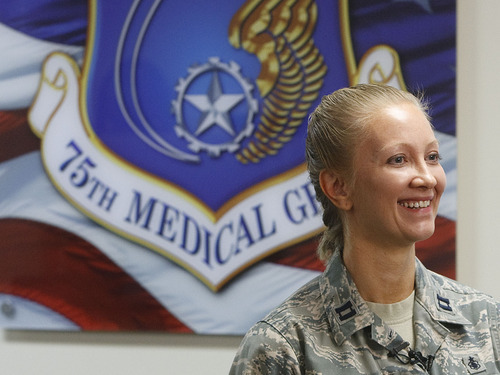This is an archived article that was published on sltrib.com in 2012, and information in the article may be outdated. It is provided only for personal research purposes and may not be reprinted.
She felt the impact of the blast in her chest.
"I was coming out of my room when it happened. I couldn't see anything. Smoke and debris were everywhere," recalled Jennifer Curtis, describing one of many too-close-for-comfort mortar attacks the Hill Air Force Base captain endured while in Afghanistan.
The rocket had landed in the middle of a U.S. Army Special Forces base near the border with Pakistan in Chamkani, Afghanistan, knocking troops to the ground. Some had obvious shrapnel wounds; others, she surmised, had concussions. And because the camp was on lockdown, Curtis, a family nurse practitioner, was the only medic available.
In the 20 minutes it took for others to arrive, she dragged six wounded men to safety, keeping those with the worst injuries alive long enough to be airlifted to a trauma center in Bagram Airfield. All of them survived.
"I had to go into nurse mode and mother mode and take care of these guys who had become my family," said Curtis of actions that earned her the Bronze Star and Air Force Combat Action Medal.
For her bravery and other feats, Curtis, 38, is also featured in this year's "Portraits of Courage," a national program spotlighting the courage of extraordinary people in extraordinary circumstances.
During her eight months in Afghanistan, Curtis was on the receiving end of fire 126 times. It was her first deployment since relocating three years ago from Brooklyn, N.Y., to Hill Air Force Base.
The Layton resident had 10 days to prepare. She couldn't tell her husband, Chad, or her two young boys where she was going. "We didn't know our mission. It just developed as we got there," said Curtis, one of six nurses to travel with the 75th Medical Group in April 2011.
After two weeks of training, team members were sent to different posts. Curtis joined a Special Forces unit in the mountains of Afghanistan to help with village stability operations.
The helicopter that carried her was targeted by mortar rounds. "It was my initiation," she said. She spent most of the time on peacekeeping visits to Afghan villages; 11 of 62 of those missions were met with gunfire and rocket-propelled grenades.
During one attack, while delivering first aid to a wounded soldier, she was told that an Afghan woman was having a heart attack yards away on the roadside. While under fire, Curtis stabilized the woman, delivering CPR until the woman's son could deliver her to the hospital.
"I learned I'm a lot stronger than I thought I was," she said.
Being the only woman among a group of men bent on protecting her was difficult. "I'd joke with the guys that if you look up and see me shooting guns, we're having a bad day," Curtis said.
Being a woman in Afghanistan also posed challenges. "Some of the villagers had never seen an American," she said.
But she knew that spreading good will had to start with women, who comprise more than half the population and are raising the next generation.
In her spare time, Curtis, another medic and an interpreter traveled to schools to teach women basic hygiene and first aid.
By learning some Poshtu and shielding her face with a scarf, she slowly earned their trust. "Suddenly there you are drinking hot chai in 90-degree weather and talking about husbands and in-laws and things that women talk about," she said.
Curtis also trained local midwives to use new ultrasound equipment and developed a series of public health messages for broadcast over the radio.
"My interpreter, I call her the Oprah of Afghanistan, was so good at it. She managed to make hepatitis sexy," she said.
Curtis said the men she served with "are the true heroes." She remains in touch with many of them via Facebook and writes letters to some of the villagers she got to know.
"They're good people who want to change their country; the poverty and lack of education," she said. "They're the ones helping our troops."





